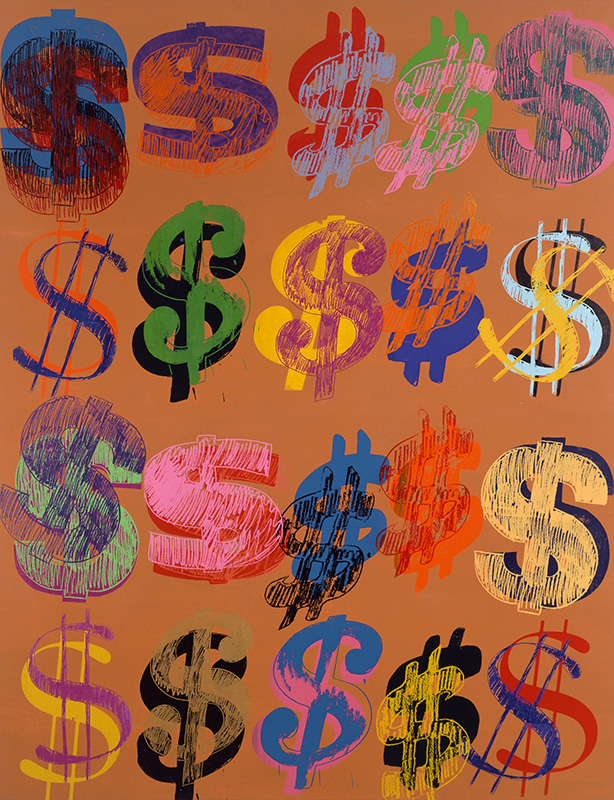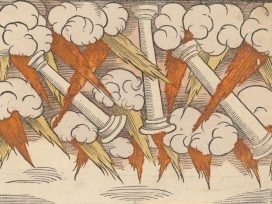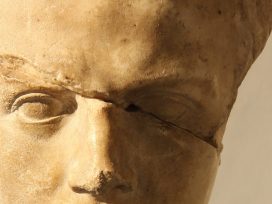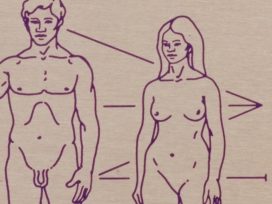My parents fought a lot about money. My mother felt that my father didn’t charge enough for his legal services, that we were being ripped off. For them, money was a many-headed god.
My father’s god was sweet and benevolent. Money could buy us shelter, help us see the world. But it wasn’t something to covet: enough money was enough, too much was depriving someone else. According to a family legend, before I was born, my father left his overcoat somewhere and someone walked off with it. ‘That’s okay,’ said my father, ‘he probably needed it more than I did.’
My mother’s money-god was cruel, stingy, unkind, but grander than my father’s – more powerful. Without money we would die, starve, go bankrupt. It provided our house, our clothes, every speck of food on our plates, every doctor who would protect us from disease. But it was also behind the fancy private schools my sister and I attended, the elegant department stores where my mother shopped, the barber shop for rich boys that she took me to – all the wealth and opportunity that would help her forget the terrifying two-year journey from Starya Sinova, a shtetl west of Kyiv, Ukraine, to Gdansk, Poland, which as Jews she and her siblings took in a horse-drawn wagon after their parents died.
My parents were both right. Money is both dreams and fears. While there’s the fantasy that having a huge amount makes one immortal, amassing it probably has to do with the opposite. But no one has the last word. Not Freud, not Elon Musk. How could anyone know all the facets of a deity that we worship so passionately?

Dollar Signs, Andy Warhol, 1982. Image via The Andy Warhol Museum, Facebook
Money obsessions
D. H. Lawrence recognized money’s entrapment. In Lawrence’s short story The Rocking-Horse Winner, a love-starved boy desperately tries to please his mother who feels unlucky because she has no money. He hears the walls of their house crying: ‘There must be more money! There must be more money!’ Money, luck and love are mixed up in his head. In the loneliness of his room, he frantically rides a rocking horse, until he works himself into a kind of trance that helps him guess the winner of horseraces. He amasses money by providing tips to his uncle, all in an attempt to win his mother’s love – until he dies of exhaustion.
My family wasn’t exactly like that of Lawrence’s story. We seemed to have just enough money. Our house didn’t cry out, but it did whisper that ‘there must be more money’. My father acted as if we had more than we really did, perhaps to counter my mother’s feeling that we had less. He tried to placate her by investing in get-rich-quick schemes: a retirement home, real estate. Over the years, I saw that his cavalier attitude toward money – at least when he talked about it – was a way to inflate himself, to appear more powerful than he really was. One summer my wife and I rented a summer house in a posh beach area. My father told us to buy a house there. He’d finance it. But whenever I asked him for the money, he always looked away.
Everybody in America worries about money. Conflicting images and needs roil around in our hearts and brains, telling us to be covetous one moment, lavish another. I don’t check my bills in restaurants, but there’s a secret fear in me that the extra dollar they’re charging might be the difference between me and poverty. We are more obsessed with money than other nations – not just Donald Trump, the standard bearer, but all of us. We have no safety net.
Walk on any city street in the US and listen to the whispers. Americans talk in numbers: four hundred and fifty thousand this, five million that, fifteen hundred an hour, ten thousand a month. Watch the series conceived by Americans: the White Lotuses, Billions, Succession. Basically, all we think about is money. Social media has taught us that everything in some way is and should be convertible to money. I have a friend who at 86 is building a new career complaining about her life on TikTok. People pay her to complain.
We also know that money isn’t money, and never has been. It’s not just Bitcoin that isn’t actual. Money has always been an agreed-upon fantasy. Gold may be a physical entity, but, as currency, it doesn’t do anything. It just sits there. And yet, the thought of a few gold Canadian maple leaf coins sitting in a safe deposit box – which I haven’t opened in years – makes me feel more secure.
Most of my savings are in the stock market because I don’t know how to protect it the way rich people do. I am inferior to them, weaker, less potent, closer to bankruptcy and death. But I can’t just let my money sit.
Two billionaires and a bankrupt
Because I grew up in a prosperous time and went to the right schools, I’ve known several billionaires. Because I became a writer, a profession where virtually no one in America can make a living, I’ve known writers on the edge of bankruptcy who counted every penny, lived off their spouses or in a fantasy that the sweet, benevolent god that my father worshiped would save them in the end. I want to tell you about three of them: two billionaires and one bankrupt. For the billionaires, there was never enough money. For the bankrupt, there seemed to be more than there really was.
A. was a high-school classmate. He liked to stand up before everyone and make speeches with one hand in his pocket, the other waving in the air; we nicknamed him The Senator. He came from a family that was poorer than most of our class, which in those days meant that both of his parents worked. He didn’t do extra-curricular activities: sports, clubs, publications. He didn’t even seem to have friends. I thought he was a bit boring. What I didn’t realize was that he was focused.
Though A. and I weren’t in contact with each other for decades, there were plenty of rumours about his successes. He married the daughter of one of the biggest real-estate owners in New York City and rapidly became his father-in-law’s right-hand man. Later, he divorced his wife but stayed on with the company. Such is American business – money trumps love.
In time he took over the entire company. And bought the Empire State Building. What a protection against death that would be! How powerful and potent it could make you feel!
A. arranged a few reunions of our high-school class in a penthouse restaurant that he also owned. He’d stroll through the crowd, one hand in his pocket, smiling quietly, proud but distracted. He didn’t look exactly at you or exactly past you. Behind the smile seemed to be a spark of fear, as if he had to be constantly on the alert for people wanting to take his money away from him.
During one reunion I was drunk on A.’s Moët & Chandon, and my tongue was loose. In some perverse way, I wanted to compliment him for actually owning the Empire State Building. ‘Late at night,’ I asked him, ‘do you ever get in the elevator and ride up and down shouting, “I own the fucking Empire State Building!?’” He paled. The smile on his face disappeared. He couldn’t tell if I was making fun of him or not. At the very least, I had been too crude for his refined tastes.
He pulled back a few inches, tilted his head, and addressed me as if talking to an ignorant journalist: ‘I don’t actually own it. It’s a corporate entity.’ He swallowed hard. He looked like he was choking on his money.
Maybe at other times, his fortune made him happy. Maybe in private or with his corporate colleagues, he celebrated their remarkable purchase. But not that night. Knowing that he owned what was for decades the biggest phallus in the world didn’t seem to give him any pleasure at all.
My friend B. was like Uncle Scrooge McDuck, who liked to swim around in a bathtub full of money. When I met him after college, he had hopes of becoming a film director, but something in him didn’t trust the dream. Before he could be what he wanted to be, he felt he needed enough money.
He started by distributing film. Then he moved onto producing kung fu and horror movies. There was always something quirky and interesting about the films he chose; he had a nose for the kind of schlock that people like in spite of themselves. In the spirit of the 1980s-1990s, his company prospered and soon he was producing movies you have surely seen.
In the early days, he was great fun to be with. He was a fearless cook and hosted terrific parties with the best weed, wine, cocaine. He bought a house overlooking Los Angeles with Picassos and Bacons on the wall. But he changed. A dark cloud settled over him. Instead of talking about movies he loved, he talked only about making money. The pressure was on. He had big-time investors. Though he had worked with friends at the beginning, now he couldn’t work with them at all. He’d taken Groucho Marx’s dictum literally: ‘I refuse to join any club that would have me as a member’. Something in him didn’t believe he was entitled to success, and his friends reflected his own unworthiness.
Or was he ashamed that he hadn’t become the film director he’d intended to be? Or was it just a question of his investors demanding that he make more money, more money?
As Y2K approached, B. devised a grand plan: he would rent a 90-cabin ocean liner, invite 270 of his closest friends on week-long shifts, and spend the last two weeks of 1999 and the first two weeks of 2000 sailing up the Amazon, out the Orinoco into the Atlantic, cruising the Caribbean. Fear, the wish to somehow avoid the potential end of the world and his flamboyance were all factors in his extravagant gesture; if the world was about to self-destruct, he’d go out in style.
I went on two legs of that trip. It was the most luxurious time of my life: gourmet food (lobster twice a day, Roederer champagne); a private plane to Angel Falls in the Venezuelan jungle; New-Year’s-Eve fireworks that went on for a full hour.
During the trip, a multinational corporation bought a big share in B’s company. Overnight he became a billionaire. Was he happy about it? Not really. The same strained look that was on A.’s face appeared on B.’s. His friends came over to him, wanting to hug him, pat him on the back. He recoiled: ‘Don’t touch me’, he kept saying. It was as if the more he had, the less he had. There must be more money, more money.
Then there is the sad story of my dear friend C., the only person I knew who went bankrupt. Among businesspeople in America, going bankrupt is not as final as it appears to be in Europe. US bankruptcy laws are lenient. We have never had debtors’ prisons. There is little personal stigma attached to business bankruptcy. On the contrary, to many it is an occasion to start with a fresh slate: vide Donald Trump and his six bankruptcies. But personal bankruptcy is different. It makes the friends of the bankrupt person queasy: ‘Will I have to take care of them? Why didn’t they see it coming? Are they secretly lazy, stupid, deaf to the cries of more money, more money?’
C. was born to write, and maybe to go bankrupt; her father was an editor on a respected New York daily newspaper that went bankrupt in the 1960s. She was a witty, charming person with a breezy style, very much in step with the hip women’s magazine world of the 1970s. An editor on several prominent magazines, she had long-term affairs with well-known writers and editors. She spent plenty of time in the Hamptons.
But as she got older, her luck began to change. Her most famous lover died, leaving her nothing. She had no children. No inheritance. By the time she was 65, the publishing world considered her out of touch with the younger generation, and she couldn’t get editorial jobs. She was used to a genteel relationship between editors, agents and writers, so when editors didn’t reply to her queries about jobs or article ideas, she smiled and fretted but didn’t bombard them with emails and phone calls, the way writers do nowadays.
Was she like the woman in D. H. Lawrence’s story, who was beautiful but had no luck? I tend to think she was more like an extreme version of my father, who also thought that the gods would somehow be benevolent. Always fashionably thin, she got thinner and thinner.
Aside from letters from famous friends and lovers, which she sold to collectors, the one thing of value she had was a rent-controlled apartment in Greenwich Village, a perfect little Bohemian pad from the 1950s. But the building itself was falling apart, rats were scaring her cat into a corner, developers were trying to force her out. How was she supposed to pay the rent? Her friends kept slipping her money individually rather than as a group, because to organize and publicly acknowledge that she was a pauper felt much too cruel for someone as proud and ladylike as C.
Finally, she declared bankruptcy. In New York State, the process takes up to six months. There are endless papers to collect, even more papers to sign. One goes to an interview with a ‘credit advisor’. If there are creditors who object to the arrangement, they have to be confronted. As I remember, the authorities also wanted her to attend ‘Debtors Anonymous’ – one of the many spin-offs of Alcoholics Anonymous – and make a kind of public confession about how she got into the mess and wouldn’t do it again. She refused. She must have done it in a graceful but firm way, because I never heard of it again.
Theoretically, bankruptcy might have liberated her. But something in her had been lost, hurt, damaged like the boy in the Lawrence story. For her, as for him, the preoccupation with money was enough to reduce all the good things in her life to something ugly.
She developed a version of Parkinson’s Disease and dozed off in the middle of conversations. After a few minutes she’d wake up smiling, apologetic for what she might have missed, relieved to be back among people who loved her. She never talked about money. She had gone bankrupt, but it wasn’t part of her identity, her view of herself.
She died shortly afterward.
In the dark secret corners of her heart, what had the bankruptcy really meant to her? That she was unloved and therefore unprotected? That her god of abundance had turned into a god of vengeance? That for her, bankruptcy was just a euphemism for death?
This article was first published in Wespennest’s issue 189 (2025) on bankruptcy in German.







